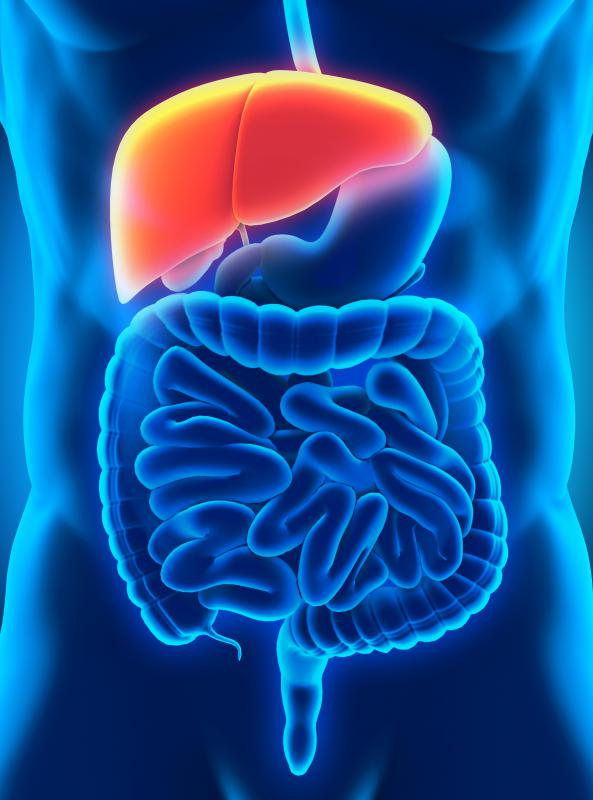At AllThingsNature, we're committed to delivering accurate, trustworthy information. Our expert-authored content is rigorously fact-checked and sourced from credible authorities. Discover how we uphold the highest standards in providing you with reliable knowledge.
What Are the Symptoms of Liver Fluke in Sheep?
Liver flukes are a type of parasitic worm that can invade the inner organs of various animals. They are particularly destructive in mammals such as sheep. Liver fluke in sheep produces a number of symptoms, including paleness along mucous-covered areas, jaundice, and failure to thrive. Abdominal pain-related nausea, vomiting, or diarrhea are perhaps most commonplace. Death can occur in the most serious cases.
Parasites survive by feeding off of other organisms, causing harm to the host. Flatworms are one such parasite, and the liver fluke is a prominent example of a flatworm. These creatures mostly invade the gallbladder and the liver, thus their name: liver flukes. Once the worms begin reproducing, however, their eggs can end up in the intestinal tract. Their main source of nutrition is blood.

As one might expect, the attacks on these bodily parts and fluids create a number of discomforting symptoms. It may take several weeks for symptoms to first manifest following a liver fluke infection. Sometimes, the parasites must become adults, spread, and begin reproducing before symptoms begin. Liver fluke in sheep can remain for years.
The most telling symptoms of liver fluke in sheep are abdominal pain and yellowing of the skin, or jaundice. A sheep that is uncomfortable may vomit, develop chronic diarrhea, and cease normal eating patterns, leading to weight loss and lack of growth. If jaundice is present with these symptoms, liver fluke may be to blame. Sheep in wetland or poorly sanitized areas are especially susceptible.

Symptoms may also develop in the mouth and eye areas. Mucous-producing coverings in both locations could become abnormally light, such as the gums and eyelids. In addition, the infected sheep could develop a condition called bottle jaw where the jaw swells and feels fluid-like.
Despite the profuse invasion on inner organs, some infected animals remain without symptoms. Even in these cases, if left untreated, major internal blood loss will likely result. This may cause sluggishness and an inability to move long distances. The liver will also be badly damaged. Severe cases can cause eventual death.

Liver fluke in sheep are known as Fasciola hepatica. They are especially prominent in Eastern Europe and Asia. While this particular type mostly infects plant-eating animals like sheep, it can infect humans as well. In most cases, the parasite takes a prolonged route to infection. It typically moves from a previously infected animal’s bowel movements into a passing small creature like a snail. Once the small creature passes over plants, the parasite remains on the plant until the object is consumed by the next infection target.
A veterinary visit should be in order if one suspects liver fluke in sheep. Drug protocols are the most common course of treatment. Prescribed medications may include Flukare® and Closicomb.
Frequently Asked Questions
What are the initial signs of liver fluke infection in sheep?

Early signs of liver fluke in sheep can be subtle, but vigilant farmers may notice a decrease in appetite, mild weight loss, and a general decrease in activity or lethargy. As these symptoms are nonspecific, they can easily be overlooked, so regular health monitoring is crucial for early detection.
How does liver fluke infection progress in sheep?
As the infection progresses, sheep may develop more pronounced symptoms such as anemia, indicated by pale mucous membranes, and bottle jaw, which is a swelling under the jaw caused by fluid accumulation. Chronic infections can lead to severe weight loss, poor wool quality, and in some cases, death if left untreated.
Can liver fluke infections in sheep be fatal?
Yes, liver fluke infections can be fatal in sheep, particularly if left untreated. The disease can cause significant liver damage, leading to liver failure. According to studies, acute outbreaks can result in death rates of up to 10%, while chronic infections can have a significant impact on productivity and overall herd health.
What is the impact of liver fluke on sheep fertility and reproduction?
Liver fluke infections can have a detrimental effect on sheep fertility and reproduction. Infected ewes may experience reduced conception rates, increased abortion rates, and weaker lambs at birth. This can lead to substantial economic losses for sheep producers due to decreased lambing percentages and slower growth rates in young stock.
How can liver fluke infection be diagnosed in sheep?
Diagnosis of liver fluke in sheep typically involves fecal examinations to detect fluke eggs, blood tests to assess liver function and anemia, and sometimes ultrasound imaging to visualize liver damage. Post-mortem examinations can also provide a definitive diagnosis by revealing the presence of adult flukes in the bile ducts of the liver.
What are the best practices for preventing liver fluke infections in sheep?
Preventing liver fluke infections in sheep involves a combination of strategic anthelmintic treatments and pasture management. Rotating pastures, avoiding grazing in wet, marshy areas where the intermediate host snail thrives, and ensuring clean water sources are key. Regular deworming schedules, tailored to the farm's specific risk level, are also essential for controlling infections.
AS FEATURED ON:
AS FEATURED ON:














Discuss this Article
Post your comments